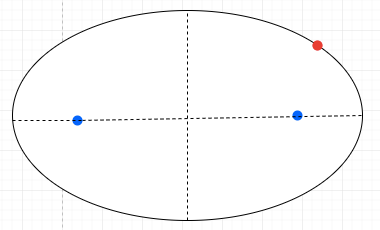What is the numerical value for "g?"
9.8 meters per second2
What are the two components of projectile motion?
Horizontal and vertical

What are the two points on the line in the center called?
Foci
What is "R"?
Resultant Vector
Jupiter's moon Europa is an example of a(n) __________ satellite?
Natural
What is the numerical value for "G?"
6.67 x 10-11 N-m2/kg2
What type of trajectory does a ball follow with projectile motion?
Parabolic
What is the formula for Eccentricity (E)?
E = D/L
Eccentricity equals the distance between the two foci divided by the length of the major axis
What is Angle θ known as?
Angle of the resultant vector
______________ is the force that acts on an object moving in a circular path, toward the center of the circle.
Centripetal
Which value of "g" is used when a ball is thrown upwards?
- 9.8 m/s2
The horizontal component of a ball's velocity with projectile motion is ___________. There is zero acceleration.
Constant
What is the value range of Eccentricity (E)?
zero to one
When calculating "R" with vectors that form a right triangle (90 degrees), which formula is used?
Pythagorean Theorem: R2 = A2 + B2
____________ is the apparent force that seems to push an object moving in a circular path away from the center of the circle.
Centrifugal
What does "G" represent? Not the numerical value, but the definition or theory.
A constant that determines the strength of the gravitational force between two objects based on their mass and distance apart.
What does the "Δ x" indicate in the equation below?:
Δ x = vox x t
Horizontal displacement of an object
This term is used to describe the point in a planet's orbit closest to the sun and where the planet moves the fastest.
Perihelion
When do we use this formula?:
θ = tan- 1 (opposite / adjacent)
OR
θ = tan - 1 (Vy / Vx)
To calculate the angle of the resultant vector
What are the units of measurement for centripetal force?
Newtons
Which scientist identified the numerical value for "G?"
Henry Cavendish
In the equation below, what does "Δ y" represent?:
Δ y = Voyt + ½ ( ayt2 )
Vertical displacement of an object
This term is used to describe the point in a planet's orbit where the planet is furthest from the sun and where the planet moves the slowest.
Aphelion
What is this formula known as?:
R2 = A2 + B2 - 2AB cos Θ
Law of Cosines
This type of velocity is always perpendicular to the radius for an object moving in uniform circular motion.
Tangential velocity